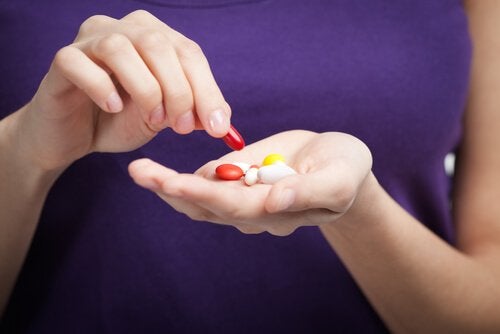Antidepressant medications can help relieve symptoms of depression, social anxiety disorder, anxiety disorders, seasonal affective disorder, dysthymia (persistent depressive disorder) and mild chronic depression. They can also alleviate other conditions, such as obsessive-compulsive disorder or post-traumatic stress disorder. But how do these medications work?
The goal of antidepressants is to correct chemical imbalances in the brain responsible for changes in mood and behavior. First developed in the 1950s, their use has become increasingly common in the last 20 years.
- It should be noted that antidepressants do not work as soon as they are taken; in many cases.
- It takes several weeks for the person to begin to notice its effects.
Research shows that antidepressant medications can be helpful for people with moderate or severe depression. They have a higher positive effect than placebo in depressed people. In general, they are not recommended for people with mild depression unless other alternatives, such as therapy, have failed. .
The Royal College of Psychiatrists estimates that between 50 and 65% of people treated with a depression medication will see an improvement, compared to 25 to 30% of people taking placebo.
Experts don’t know exactly how some antidepressants work. Most antidepressant medications work by increasing levels of specific neurotransmitters in the brain. In general, what they do is prevent these neurotransmitters from being recaptured from the intersynaptic space.
This means that they remain in synapses longer, resulting in more activity, so they compensate for reduced levels. In this way, antidepressants allow other neurotransmitters to work more efficiently, so the overall activity is somewhat standardized.
However, this does not really explain how antidepressants end up relieving depressive symptoms, neurotransmitters are like the basic elements to build something much more complex, this is the equivalent of numbers in numbers or letters in language, so increasing levels of neurotransmitters throughout the brain shows nothing specific.
On the other hand, antidepressants immediately increase the activity of neurotransmitters; however, therapeutic effects often take weeks to perceive at a more subjective level.
Many researchers believe that the benefits of antidepressants are derived from the way they affect certain brain circuits by altering neurotransmitter levels. We’re talking about Serotonin, Dopamine and Norepinephrine.
Different types of antidepressant medications seem to affect the level of these neurotransmitters in several ways. Next, we’ll explain how this happens.
Some of the most commonly prescribed antidepressants are called reuptake inhibitors and it is a process by which neurotransmitters are naturally reabsorbed by nerve cells in the brain after release to send messages to each other.
A recapture inhibitor prevents this from happening; instead of being reabsorbed, the neurotransmitter remains, at least temporarily, in the space between the nerves, called intersynaptic space.
In theory, the advantage of these drugs is to keep the levels of a certain neurotransmitter at a high level, which could improve communication between nerve cells, strengthening the brain circuits that regulate mood.
There are different types of reuptake inhibitors, depending on the different neurotransmitters they want to target, including:
Tetracyclics are another type of antidepressant that, although affecting neurotransmitters, does not prevent recapture in the same way, but appears to prevent neurotransmitters from sticking to specific nerve receptors, as norepinephrine and serotonin do not bind to receptors, they accumulate between nerve cells as a result, levels of neurotransmitters are increasing.
These depression medications work in two ways. On the one hand, they prevent Serotonin reuptake. On the other hand, they prevent Serotonin particles that are released into a synapse from binding to certain unwanted receptors. Instead, redirect them to other receptors that can help nerve cells function better in the neural circuits associated with mood.
These medications were the first to be used against depression, although they are effective, they can have significant side effects, especially severe in case of overdose. Today, many doctors use these medications only when new and better tolerated ones have no effect.
However, tricyclics and monoamine oxidase inhibitors (MAOI) can sometimes be very useful for people with treatment-resistant depression or certain forms of depression (such as depression that coexists with high levels of anxiety).
Tricyclic antidepressants also prevent reuptake of neurotransmitters, but they do so non-selectively, so they act, among others, on serotonin, norepinephrine and dopamine at the same time, although these drugs are clearly effective in treating depression, they are currently being replaced by more specific medications.
Monoamine oxidase inhibitors (MAOI) block the effects of monoamine oxidase, a natural enzyme that breaks down serotonin, epinephrine and dopamine, so levels of these neurotransmitters can increase.
The disadvantage is that MAOMs also block the body’s ability to break down other drugs metabolized by this enzyme, which increases the risk of high blood pressure, as well as levels of an amino acid called tyrosine found in certain foods, such as cold meats and cheeses. .
OICIs should also not be associated with other medications that can increase serotonin (such as certain migraine medications or other antidepressants); in this way, they can cause an excessive build-up of serotonin, called serotonin syndrome, a change that can be fatal.
Much of what is thought about antidepressants today remains speculative. It is unclear whether low levels of Serotonin or other neurotransmitters cause depression or whether elevated levels will resolve it. We may not yet know enough about brain chemistry to say what is balanced or unbalanced.
Antidepressants may have other unknown effects and their benefits may not be as much related to neurotransmitter levels as to other effects, such as regulatory genes that control the growth and function of nerve cells.
This may not seem very reassuring. However, while experts don’t have all the answers about how antidepressants work, we know they can act. Many studies have shown that antidepressants can help many people feel better, and that’s what really matters.

